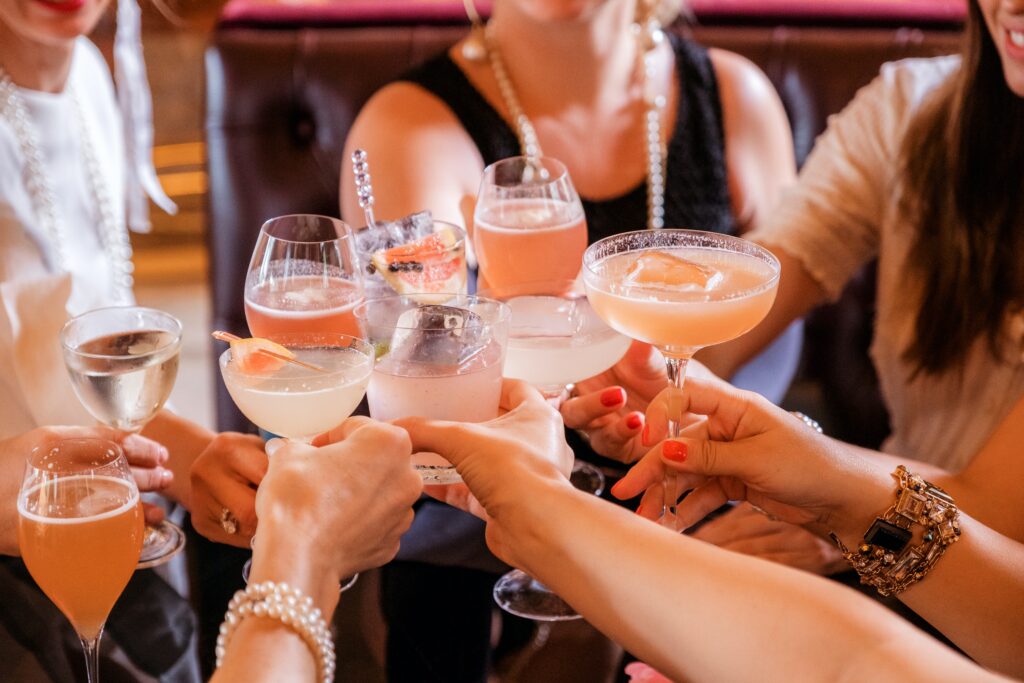
Drinks in French: 150 Words and Phrases for Beverages
One of the first things you’ll likely do in France, or even in a French restaurant or café in your hometown, is order a drink.
So a good place to start is the words for “drink” in French. A non-alcoholic drink is une boisson and an alcoholic beverage is un verre (literally: “a glass”).
If you sit down in a French restaurant or bar, the drinks interaction will probably start with the server asking you: Qu’est-ce que vous voulez boire ? (What do you want to drink?)
This guide to drink names, from coffee to cocktails, and ordering drinks in French will never leave you high and dry (or thirsty), or sounding like a sauvage (savage).
Contents
- Drinks in French
- Ordering a Drink in French
- Coffee in French
- Alcoholic Drinks in French
- Buying and Ordering Wine in French
- French Drinking Phrases
- And one more thing...
Download: This blog post is available as a convenient and portable PDF that you can take anywhere. Click here to get a copy. (Download)
Drinks in French
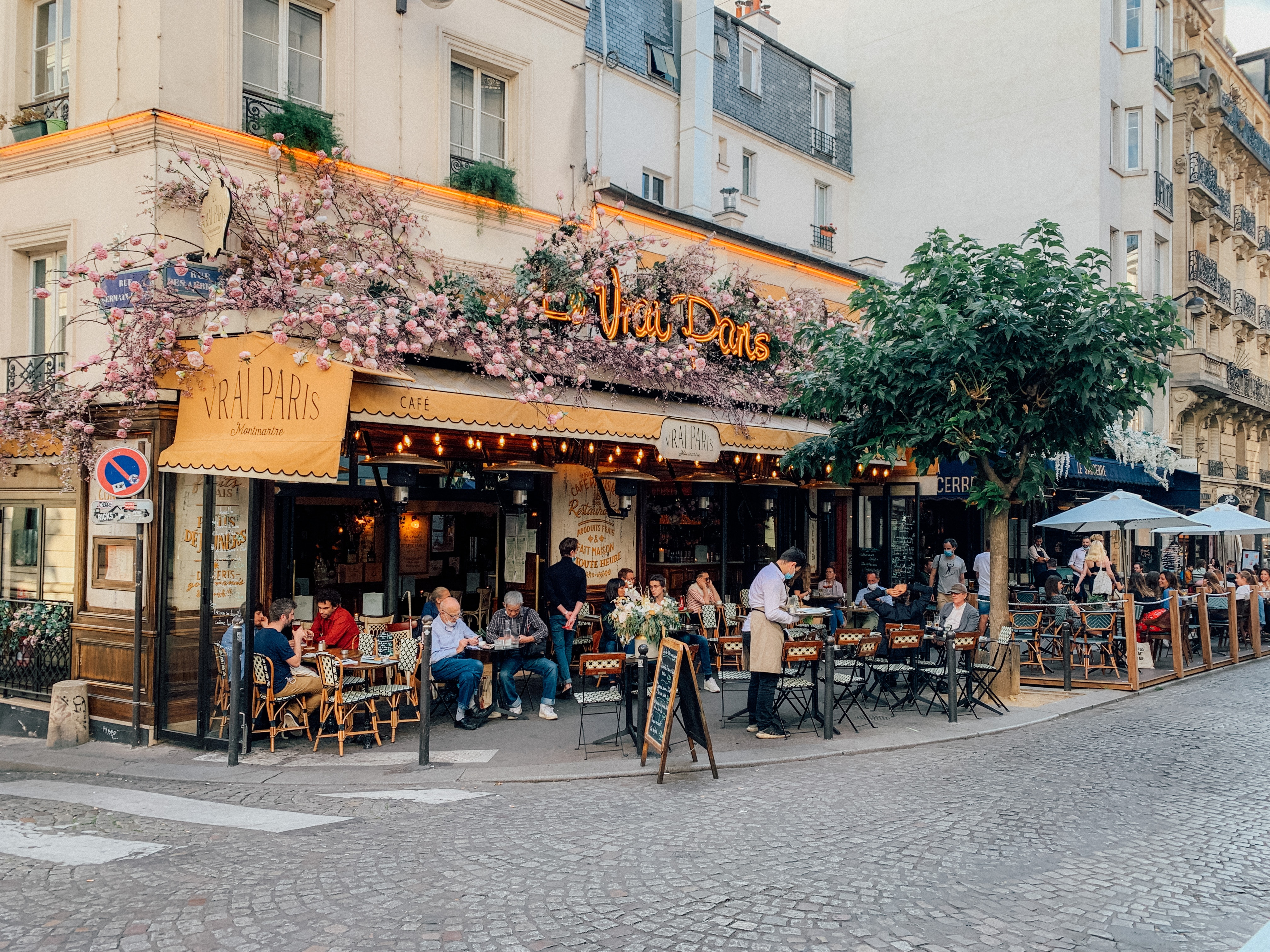
If you’re thirsty, or avoir soif (to be thirsty), there are countless types of drinks you can order.
But before we do that, you’ll probably want to know how to say “to drink.” It’s boire . “To sip” is siroter , which works better with wine.
Whether you go to a café, a restaurant or a grocery store, you’ll also need to know the names of everyday drinks such as water, coffee and milk, so that’s where we’ll start:
| English | French |
|---|---|
| Aperitif | L'apéritif |
| Water | L'eau |
| Coffee | Le café |
| Tea | Le thé |
| Juice | Le jus |
| Milk | Le lait |
| Hot chocolate | Le chocolat chaud |
| Wine | Le vin |
| Beer | La bière |
| Champagne | Le champagne |
| Cocktail | Le cocktail |
| Soda | Le soda |
| Smoothie | Le smoothie |
| Carbonated drink | La boisson gazeuse |
| Coca Cola | Le coca |
| Lemon soda/Sprite | La limonade |
Ordering a Drink in French
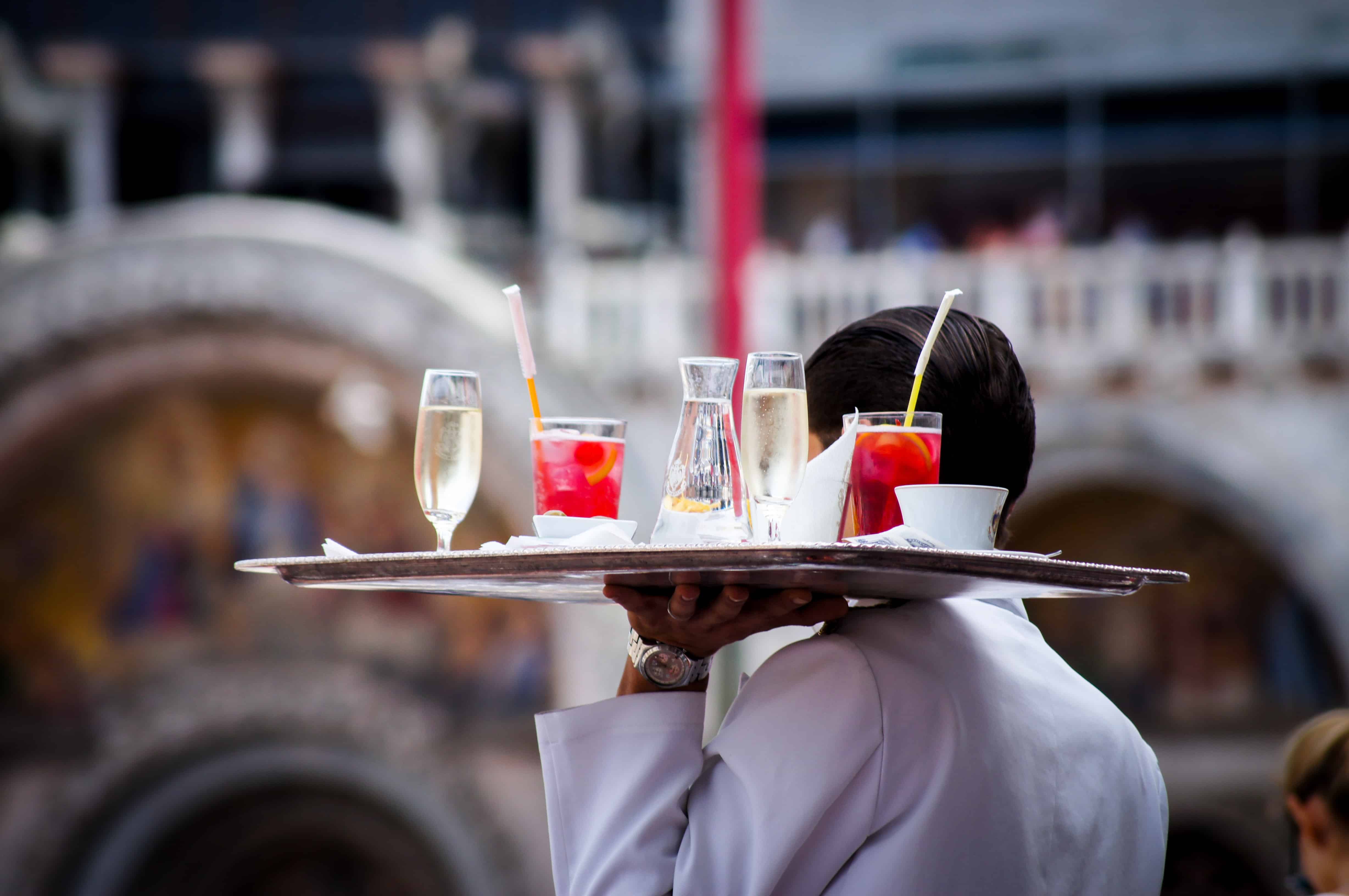
Here are some examples of basic phrases you’ll need to know no matter what type of drink you’re ordering:
| English | French |
|---|---|
| I would like to see the drink menu | Je voudrais voir la carte des boissons s'il vous plaît. |
| I would like some tea please | Je voudrais prendre du thé s'il vous plaît. |
| I would like some water | Je voudrais de l'eau. |
| I would like to order some wine please | Je voudrais commander du vin s'il vous plaît. |
| I would like... | Je voudrais... |
| Can I have... | Puis-je avoir... |
| I'll take... | Je prendrai... |
| Could you give me... | Pourriez-vous me donner... |
| One... | Un / une... |
| Please | S'il vous plaît |
| What do you have for... | Qu'est-ce que vous avez comme... |
| I prefer... | Je préfère... |
| Do you serve... | Est-ce que vous servez... |
| A bottle of... | Une bouteille de... |
| A glass of... | Un verre de... |
| With ice cubes | Avec glaçons |
As you can see, even when using other verbs such as prendre (to take) or commander (to order), I highly recommend you still use voudrais because it’s truly the most polite and accepted way to order in French.
Just as we use different terms when asking for drinks in English (a can of soda, a bottle of water, etc.), the French have many different ways of expressing drink types and quantities.
Knowing how to ask for a drink using the correct terms and quantity words will come in handy when ordering food in French, whether it’s on the go or at almost any sit-down restaurant in France.
Here are some examples:
| English | French |
|---|---|
| A bottle | Une bouteille |
| A glass | Un verre |
| A cup | Une tasse |
| A disposable cup | Un gobelet |
| A shot | Un shot |
| A bowl | Un bol |
| A can | Une canette |
| A pot/jar | Un pot |
| A liter | Un litre |
| Half a liter | Un demi-litre |
| A quarter of a liter | Un quart de litre |
| A pitcher | Un pichet |
| A pint | Une pinte |
| A wine glass | Un verre à vin |
| A small can | Une mini canette |
Let’s face it — for many of us, coffee is the most important drink of the day!
Coffee in French
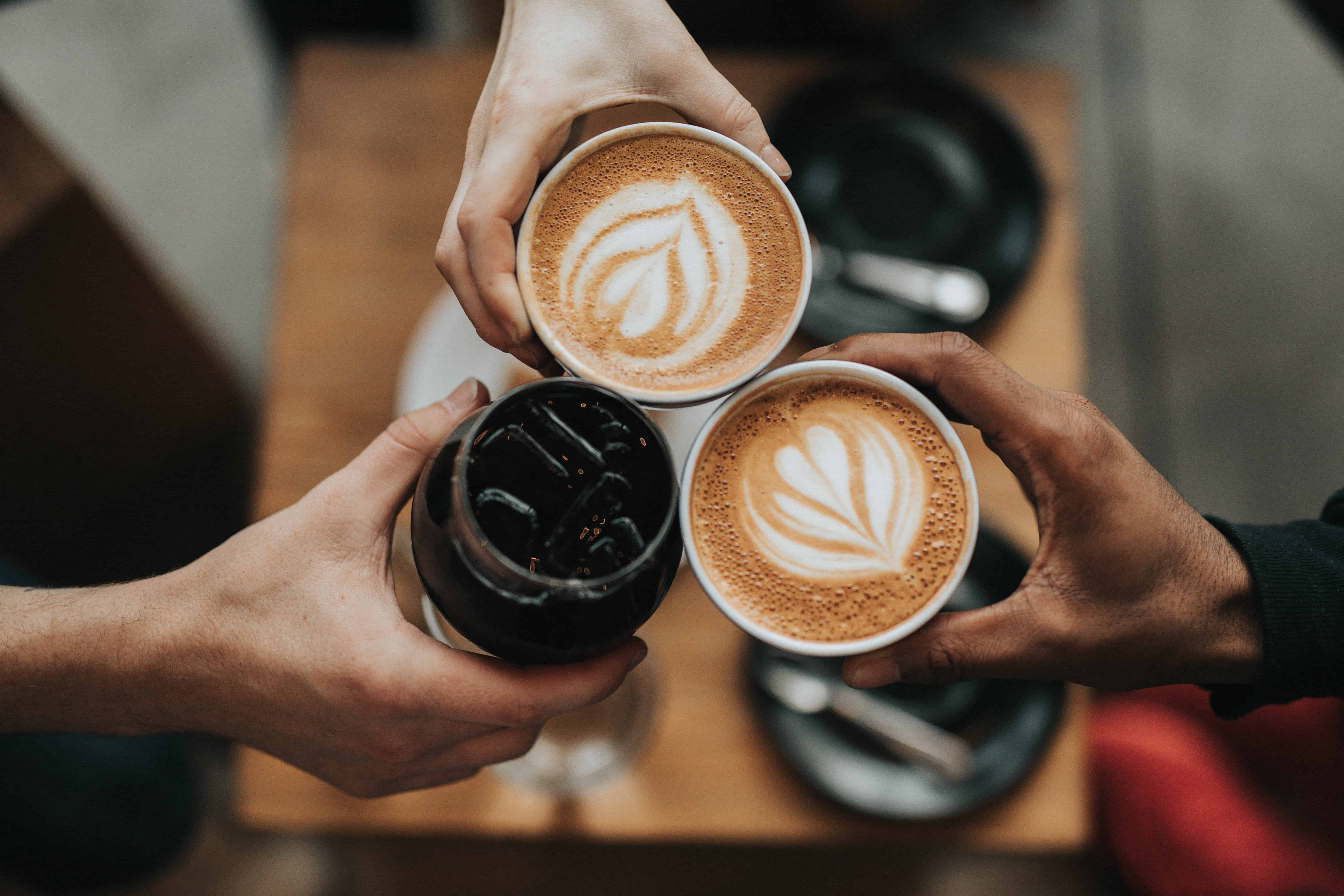
Here are a few words and phrases for ordering this must-have in one of France’s many quaint cafés. That’s right: learn how to order coffee in French.
| English | French |
|---|---|
| A coffee (usually referring to a small espresso) | Un café |
| Black coffee | Un café noir |
| Coffee with more water (similar to an Americano) | Un café allongé |
| Coffee with cream (similar to a latte) | Un café crème |
| Coffee with milk | Un café au lait |
| Cappuccino | Un cappuccino |
| Café latte | Un café latte |
| Espresso | Un expresso |
| Decaffeinated coffee | Un décaféiné |
| Strong espresso (short and strong) | Un café serré |
| Sweetened coffee | Un café sucré |
| Iced coffee | Un café glacé |
| Viennese coffee (coffee with whipped cream) | Un café viennois |
| A coffee served with small desserts | Un café gourmand |
| A filtered coffee/American coffee | Un café filtre |
| Double espresso | Un café double |
| I would like a coffee. | Je voudrais un café |
| A coffee, please. | Un café s'il vous plaît |
| I'll take an espresso. | Je prendrai un expresso |
| An Americano, please. | Un café allongé s'il vous plaît |
| A cappuccino, please. | Un cappuccino s'il vous plaît |
Alcoholic Drinks in French
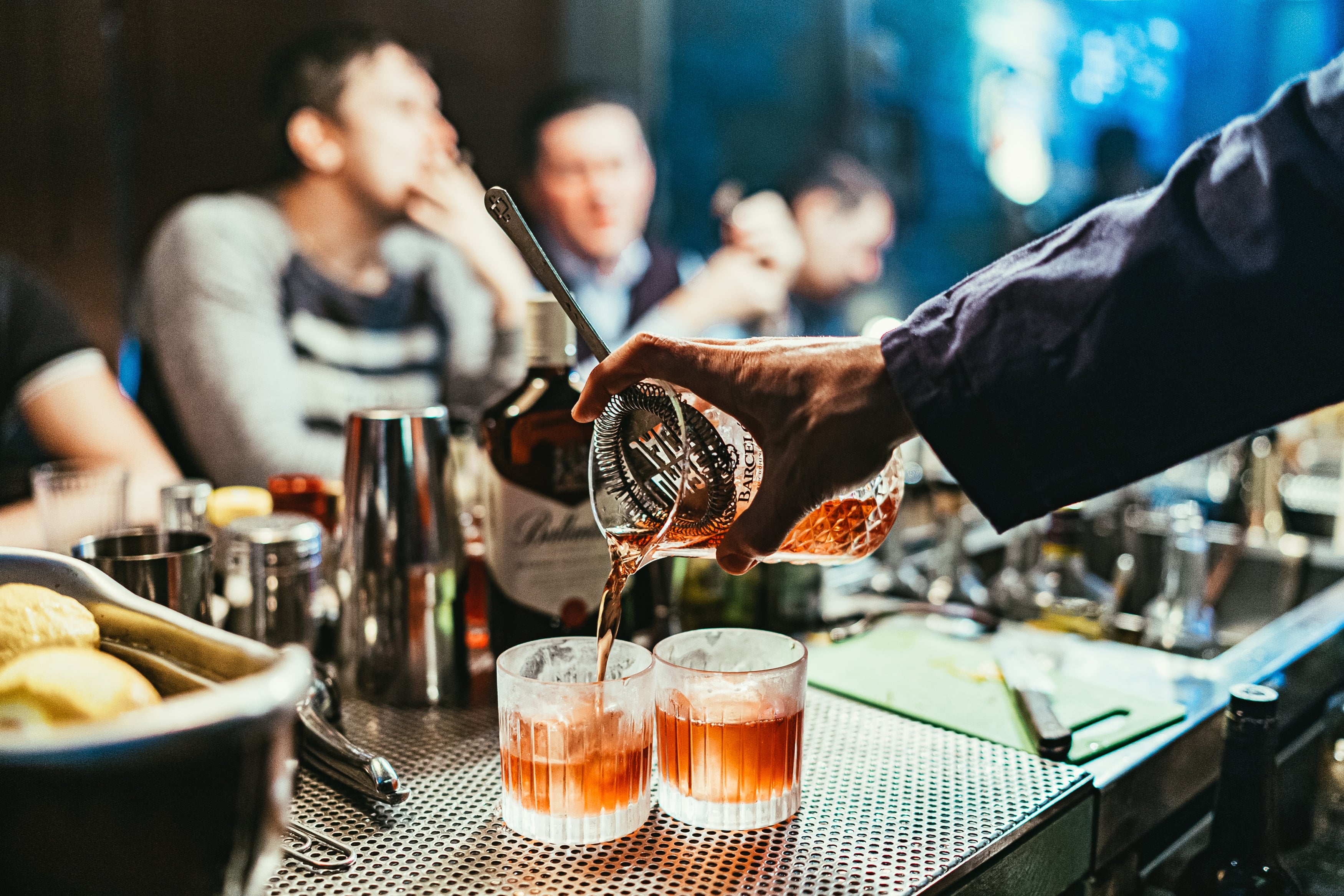
A night out can be a blast, especially if you have the right vocabulary!
| English | French |
|---|---|
| Bar | Le bar |
| Bartender | Le barman |
| Wine | Vin |
| Beer | Bière |
| Champagne | Champagne |
| Sake | Saké |
| Rum | Rhum |
| Whisky | Whisky |
| Vodka | Vodka |
| Tequila | Tequila |
| Cognac | Cognac |
| Liqueur | Liqueur |
| Aperitif | Apéritif |
| Digestif | Digestif |
| Cocktail | Cocktail |
| Mojito | Mojito |
| Cosmopolitan | Cosmopolitan |
| Margarita | Margarita |
| Martini | Martini |
| Daiquiri | Daïquiri |
| Mimosa | Mimosa |
| Punch | Punch |
| Kir Royal | Kir Royal |
| Cider | Cidre |
| French 75 | French 75 |
| Pastis (anise-flavored liquor) | Pastis |
Buying and Ordering Wine in French
As you can imagine, wine is a big deal in France. Because of this, there’s a whole set of vocabulary associated with it.
As such, when walking into a wine shop in France or asking for help in selecting wine at a finer restaurant, you may hear the phrase, “Vous voulez mettre combien ?” (How much are you looking to spend?) or “Vous désirez une bouteille de vin dans les combiens ?” (What is your price range for a bottle of wine?).
In response to the first question, simply state the number you’re willing to spend (for example, “40 euros maximum”). To reply to the second type of question, use this form: “Dans les 40 euros environ” (Around 40 euros).
Here are some more wine words for all you wine enthusiasts out there!
| English | French |
|---|---|
| Wine | Vin |
| Red wine | Vin rouge |
| White wine | Vin blanc |
| Rosé wine | Rosé |
| Dry wine | Vin sec |
| Mulled wine | Vin chaud |
| Sweet wine | Vin doux |
| Vintage | Cru |
| Vine | La vigne |
| Wine cellar | La cave |
| Grape variety | Cépage |
| Vineyard | Le vignoble |
| Terroir, sense of place | Terroir |
| Aroma, bouquet | Bouquet |
| Aromas | Arômes |
| Dry | Sec |
| Sweet | Doux |
| Balanced | Équilibré |
| Fruity | Fruité |
| Tannic | Tannique |
| Light | Léger |
| Full-bodied | Corsé |
| Citrus fruits | Agrumes |
| Red fruits | Fruits rouges |
| Dark fruits | Fruits noirs |
| Oak | Chêne |
| Vanilla | Vanille |
| Spicy | Épicé |
| Mineral | Minéral |
| Well aerated | Bien aéré |
| A glass of wine, please. | Un verre de vin s'il vous plaît |
| I'm looking for a dry red wine. | Je cherche un vin rouge sec |
| Do you have a full-bodied white wine? | Avez-vous un vin blanc corsé ? |
| What is the specialty of the region? | Quelle est la spécialité de la région ? |
For even more words and phrases about French wine culture, check out this excellent video:
FluentU takes authentic videos—like music videos, movie trailers, news and inspiring talks—and turns them into personalized language learning lessons.
You can try FluentU for free for 2 weeks. Check out the website or download the iOS app or Android app.
P.S. Click here to take advantage of our current sale! (Expires at the end of this month.)
French Drinking Phrases
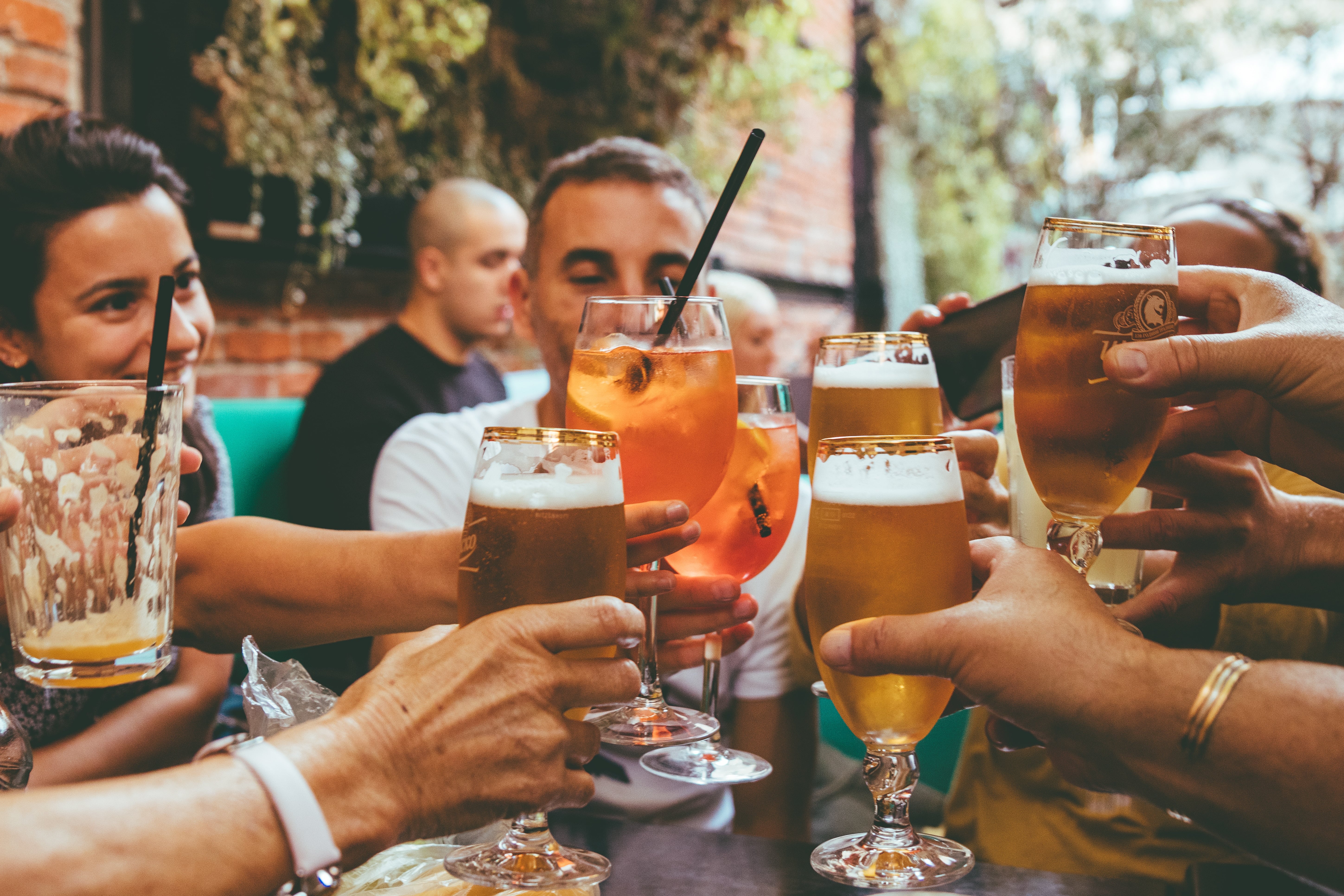
When you’re drinking (especially wine or other alcoholic drinks) with others in France, you’ll hear a lot of drinking-specific phrases. These are the French equivalents of English phrases like “Cheers!” and “Bottoms up!”
So learn how to say “Cheers!” in French.
| English | French |
|---|---|
| Cheers! | Santé ! |
| To yours! | À la vôtre ! |
| To yours and mine! | À la vôtre et à la mienne ! |
| To yours! (informal) | À la tienne ! |
| To your health! (informal) | À ta santé ! |
| Let's toast! | Trinquons ! |
| To your good health! | À la bonne vôtre ! |
| Let's raise a toast! | Portons un toast ! |
| Health and happiness! | Santé et bonheur ! |
| To life! | À la vie ! |
| It's delicious! | C'est délicieux ! |
| Enjoy it! | Profitez-en ! |
| Let's clink glasses! | On trinque ! |
| To your success! | À ta réussite ! |
| To love! | À nos amours ! |
| To friendship! | À l'amitié ! |
| One more glass! | Un verre de plus ! |
| Cheers! (informal) | Tchin-tchin ! |
| To yours and ours! | À la vôtre et à la nôtre ! |
No matter where or when you go to a Francophone country, you’ll be a bit more prepared with the phrases above!
Happy traveling and tchin-tchin!
Download: This blog post is available as a convenient and portable PDF that you can take anywhere. Click here to get a copy. (Download)
And one more thing...
If you like learning French on your own time and from the comfort of your smart device, then I'd be remiss to not tell you about FluentU.
FluentU has a wide variety of great content, like interviews, documentary excerpts and web series, as you can see here:

FluentU brings native French videos with reach. With interactive captions, you can tap on any word to see an image, definition and useful examples.

For example, if you tap on the word "crois," you'll see this:

Practice and reinforce all the vocabulary you've learned in a given video with learn mode. Swipe left or right to see more examples for the word you’re learning, and play the mini-games found in our dynamic flashcards, like "fill in the blank."

All throughout, FluentU tracks the vocabulary that you’re learning and uses this information to give you a totally personalized experience. It gives you extra practice with difficult words—and reminds you when it’s time to review what you’ve learned.
Start using the FluentU website on your computer or tablet or, better yet, download the FluentU app from the iTunes or Google Play store. Click here to take advantage of our current sale! (Expires at the end of this month.)



